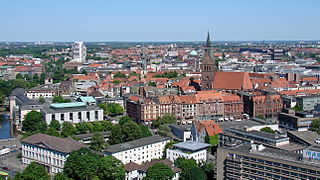
Hanover is the capital and largest city of the German state of Lower Saxony. Its population of 535,932 (2021) makes it the 13th-largest city in Germany as well as the fourth-largest in northern Germany after Berlin, Hamburg and Bremen. Hanover's urban area comprises the towns of Garbsen, Langenhagen and Laatzen and has a population of about 791,000 (2018). The Hanover Region has approximately 1.16 million inhabitants (2019) and is the largest in the Hanover–Braunschweig–Göttingen–Wolfsburg Metropolitan Region, the 17th biggest metropolitan area by GDP in the European Union.
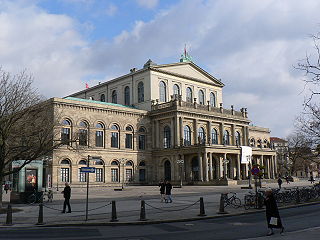
Hanover State Opera is a German opera company based in Hanover, the state capital of Lower Saxony. The company is resident in the Hanover Opera House, and is part of a publicly-funded umbrella performing arts organisation called Hanover State Theatre of Lower Saxony, or simply Hanover State Theatre.

Gustav Friedrich Wilhelm Großmann was a German actor, writer, and stage director. He wrote the text of the famous operatic Schauspiel mit Gesang Adelheit von Veltheim, with music by Christian Gottlob Neefe.

Hanover University of Music, Drama and Media is a university of performing arts and media in Hanover, the capital of Lower Saxony, Germany. Dating to 1897, it has reorganised and changed names as it developed over the years, most recently in 2010 when it changed from State College of Music and Drama Hanover. From 2010 until March 2024, its president was Susanne Rode-Breymann. As of 2023, the university has 1,447 students, and as of 2021 a total of 477 staff.
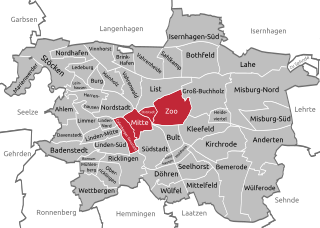
Mitte is the first borough of Hanover, the state capital of Lower Saxony. As of 2020, it has 36,645 inhabitants and consists of the quarters Mitte, Calenberger Neustadt, Oststadt and Zoo. The district mayor is Cornelia Kupsch (CDU).
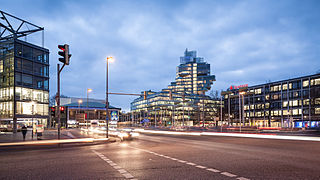
Aegidien Gate Square is a busy square known colloquially as Aegi in Hanover, Germany. Located above a subway station of the same name, the square was named for the Aegidien Gate, one of the city gates of medieval Hanover. While the gate was removed in 1780, the square is still named after it.
The following is a timeline of the history of the city of Hanover, Germany.
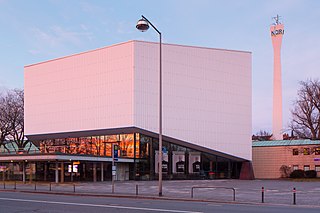
The State Radio House of Lower Saxony is a group of buildings owned by the public broadcaster Norddeutscher Rundfunk in Hanover, the state capital of Lower Saxony, Germany.

Hanover Drama is a theatre company in Hanover, the state capital of Lower Saxony, Germany. The company is resident at the Hanover Playhouse situated approximately 200 metres (660 ft) east of Hanover Opera House, and the Ballyard situated approximately 530 metres (1,740 ft) west-southwest of the opera house in the old town. Collectively these venues have five stages:
The term Landesbühne or Landestheater is added to the name of some publicly owned theatre companies in Germany and Austria. These companies have a mandate to perform in areas without public theatres. Less than half of performances usually take place at the seat of a Landesbühne, thereby distinguishing them from the so called Stadttheater or Staatstheater. Legal control can lie with the respective Bundesland or a collaboration of several municipalities and local authorities. The spectrum of presented productions can be very diverse. The repertoire can include all or parts of the popular disciplines: play, musical theatre, ballet, and children's and youth theatre.
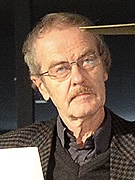
Hugo Thielen is a German freelance author and editor, who is focused on the history of Hanover, the capital of Lower Saxony, in a lexicon of the city, another one especially of its art and culture, and a third of biographies. He co-authored a book about Jewish personalities in Hanover's history.
Heinrich Sievers was a German musicologist, music critic, university lecturer, and conductor. He was regarded as an authority on the history of music in Hanover and Lower Saxony, and wrote music-historical monographs in English and Finnish publications.
Waldemar R. Röhrbein was a German historian. He worked as a museum director in Lower Saxony, his last post being from 1976 to 1997 at the Historisches Museum Hannover, and was president of the Homeland Federation of Lower Sachsony. He contributed to encyclopedias about Hanover's history and culture.

Hanover Historical Museum is an historical museum situated in Hanover, the capital of Lower Saxony, Germany. The museum was founded in 1903 as the Homeland Museum of the City of Hanover. Its collections are related to the history of the city, the history of the House of Guelf, and of the state of Lower Saxony.
Gotthard Kronstein was a German operatic baritone and theatre director.
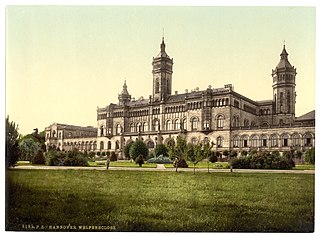
Christian Heinrich Tramm was a German architect who, in 1850, introduced the Rundbogenstil in Hanover.
Adolf Falke was a German architect, draughtsman, designer, stage designer and municipal politician.
Hannover Concerts is a concert agency from Hanover. The company is considered one of the largest concert promoters in northern Germany.

The Hans Otto Theatre, named after the actor Hans Otto, is a municipal theatre in Potsdam in Germany. Its headquarters and main venue is in the Großes Haus am Tiefen See in Potsdam's cultural district on Schiffbauergasse. Other regular venues are the neighbouring historic Reithalle and occasionally the Palace Theatre in the Neues Palais.

The State Theater of Lower Saxony North (LBNN) is a theater founded in 1952 and located in Wilhelmshaven. Originating from the Ostfriesische Landesbühne in Leer, it is now one of two Landesbühnes in Lower Saxony. One of the special features of these theaters is that they not only provide theater art for their hometown and administrative headquarters but also a large performance area in rural areas. In the case of the Landesbühne Niedersachsen Nord, which traveled as far as the Lüneburg Heath in the 1950s, the venues initially changed every year. Today, the theater presents its productions in a region inhabited by 720,000 people, ranging from Ostfriesland to Emsland and Oldenburger Münsterland.















